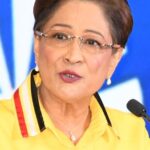China’s Foreign Minister Wang Yi arrived in Rio de Janeiro on Tuesday to attend the BRICS Foreign Ministers’ Meeting, marking a pivotal moment in the group’s ongoing effort to bolster multilateral cooperation among the world’s leading emerging economies.
Wang was officially welcomed by Brazil’s Foreign Minister Mauro Vieira ahead of the high-level talks, which bring together top diplomats from Brazil, Russia, India, China, and South Africa. The meeting aims to lay the groundwork for the upcoming BRICS Leaders’ Summit, while tackling key issues such as global economic recovery, regional stability, and the potential expansion of the bloc.
Strategic Focus on Global South and BRICS Expansion
China is expected to use the platform to call for deeper strategic coordination among BRICS members and a stronger collective voice for the Global South in international institutions such as the UN, IMF, and World Bank.
“China firmly supports the expansion of BRICS and believes that emerging markets and developing nations deserve a greater role in shaping the global agenda,” Wang said upon arrival, according to Chinese state media.
Wang’s visit comes amid heightened geopolitical competition and calls from several member states to explore a BRICS common currency, promote alternative trade mechanisms, and reduce reliance on Western-led financial systems.
Brazil Eyes Climate and Development Cooperation
As this year’s BRICS chair, Brazil is steering the agenda toward inclusive economic development, climate cooperation, and strengthening South-South trade. Foreign Minister Mauro Vieira said the Rio talks would reflect “a shared commitment to reshaping a more balanced, multipolar world.”
India and South Africa are also expected to emphasize digital transformation, energy security, and investment in critical infrastructure.
Russia’s Participation Draws Attention
Russia’s role in the BRICS meeting has drawn international scrutiny amid its ongoing war in Ukraine. However, Moscow continues to prioritize BRICS as a core pillar of its foreign policy and a vital diplomatic counterweight to Western sanctions and isolation.
Russian Foreign Minister Sergey Lavrov, also attending, said BRICS “remains a crucial platform for fostering multipolarity and resisting unilateralism.”
What’s Next?
The outcomes of this ministerial meeting will directly shape the BRICS Leaders’ Summit, scheduled for later this year, where decisions on expanding membership and strategic frameworks are expected.
More than 20 countries including Argentina, Saudi Arabia, and Indonesia have formally expressed interest in joining the bloc, a sign of BRICS’ rising appeal amid growing dissatisfaction with current global governance structures.



